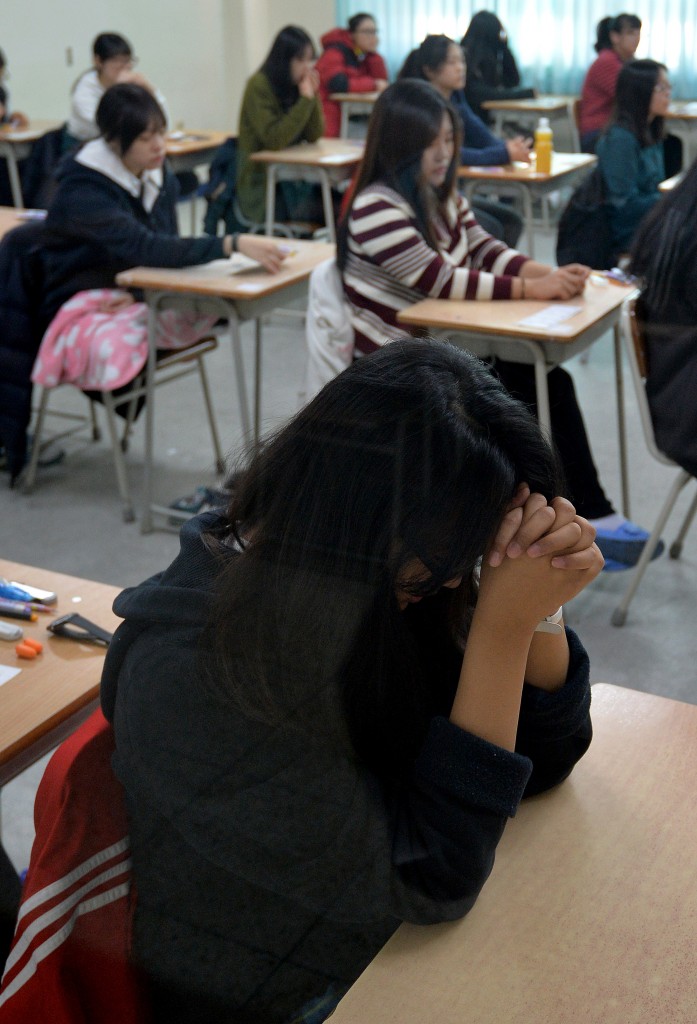- California Assembly OKs highest minimum wage in nation
- S. Korea unveils first graphic cigarette warnings
- US joins with South Korea, Japan in bid to deter North Korea
- LPGA golfer Chun In-gee finally back in action
- S. Korea won’t be top seed in final World Cup qualification round
- US men’s soccer misses 2nd straight Olympics
- US back on track in qualifying with 4-0 win over Guatemala
- High-intensity workout injuries spawn cottage industry
- CDC expands range of Zika mosquitoes into parts of Northeast
- Who knew? ‘The Walking Dead’ is helping families connect
‘Hell Joseon’ through the eyes of Korean Americans

Students wait to take the annual College Scholastic Ability Test at a high school in Seoul on Nov. 13, 2014. (Yonhap file)
By Jane Han
DALLAS ― More and more young men and women of Korea find life in their motherland so painfully tough that they literally call it hell, some even plotting to pick up and leave to another country.
But what happens when you really take off?
The Korea Times talked to 10 men and women from different walks of life who’ve immigrated to the U.S. within the past decade and here’s what they had to say about the reality of departing ‘”Hell Joseon,” a viral term that embodies young people’s sense of hopelessness in Korea.
“I’ll be honest,” said Kim Ga-young, 38, who left Korea for Atlanta two years ago after leaving her job in the customer service industry. “I don’t have to put up with nonsense brought on by all kinds of snobby people. But I’m facing a whole new set of problems here, too.”
Language and cultural barriers are the biggest trouble for her.
“I’ve never been overseas past Japan. The U.S. and the western world is completely new to me, so it’s definitely going to take some time to find my place here,” says Kim, who works part-time at a Korean-owned beauty supply store.
Park Jung-hyun, 55, who made the big move almost 10 years ago, is happy to say that most of the language and cultural barriers are a thing of the past now.
“The first three years was difficult and sad,” she says, “but once I understood the true American life, I realized that I don’t have to be ashamed about not speaking the language and knowing the culture. In a way, many of us are foreigners here.”
Park, who owns and runs a coin laundry shop in Los Angeles with her husband, finds her new life satisfying, both financially and emotionally.
“My husband and I both worked long hours back in Korea,” she said, “and we still work long hours now, but interestingly, there’s a much better work-life balance here.”
Many Koreans who live in the U.S. generally have access to more family time throughout the week and during the weekend, but for some, family time isn’t the only thing they want.
“There’s a saying that Korea is a fun hell and the U.S. is a boring heaven,” says Kim, 41, a hairdresser in Dallas, who didn’t want to be fully named. “I miss being able to just walk out late at night, meeting up with old friends and getting a drink without the hassle of driving on the freeway for 30 minutes to get somewhere.”
Kim Ji-hyun, 32, an accountant in Dallas, agrees that although her stress level is lower here, something about life is mundane.
“It’s pretty much work, home and church,” she says. “Life can’t get any more simple. I’m not necessarily complaining, but you know, sometimes you want more excitement and spontaneity.”
Kim’s husband, Ji-hoon, 34, however, couldn’t be any more thankful to have “escaped” his mother country.
A doctoral student, Kim says research was often sacrificed for other non-essential things, such as school politics.
”In Korea, there is a pretty big emphasis on things outside of performance. It’s hard to meet all those expectations,” he says. ”Here, I feel as though I can really focus on what’s important and no one will mess with that.”
Choi Joon-hyun, 50, who worked for a top conglomerate in Seoul for almost 15 years, couldn’t agree more that he, too, used to spend a lot of time and energy on non-work-related matters, but for him, it wasn’t all bad.
“At that time, I hated it,” says Choi, who now runs his own small business in New Jersey. “Trying to read the face of my superiors, going on drinking bouts day after day, and just caring too much about others. But now, I sort of miss that whole social dynamic.”
Many Korean immigrants who are self-employed commonly share their longing for being part of a social community.
“That sense of belonging is something we have to struggle to find in this immigrant society,” says Alina Kim, 44, a realtor in Atlanta. “That’s why so many Koreans attend church in the U.S. even if they don’t really believe in God. People simply want to belong somewhere.”
Blending into the real American society is never thought to be easy, she said, adding that racism, whether subtle or direct, still exists every day.
“I’m a professional and, as much as I don’t want to admit it, I sometimes feel as if I’m being looked down on because of the color of my skin and hair,” he says. “That’s just something I have to be able to confront if I want to live and succeed here.”
John, 41, a pharmacist in Fairfax, Virginia, who didn’t want to be fully named, agrees that racism is still a problem in America.
Even those who are downright happy about not being part of “Hell Joseon” have one thing they stay up nights about.
“Family,” says Chung Moon-hwe, 45, a nurse in Los Angeles. “It hurts that I can’t see my parents when I want to. Once a year or every other year is just too long of a time to be away from the people you love.”
Kim Ji-young, 38, a stay-at-home mom in Seattle, says her life in the U.S. is pretty much what people imagine it to be.
“It’s relaxed and peaceful for the most part, but sometimes I ask myself if that’s my top priority,” says Kim, who moved to the U.S. five years ago following her husband’s job transfer.
“I ask my children what they want because I want to open up their option to live in Korea. Even if today’s young people find the country to be hellish, the future can and hopefully will change,” she said.















![넷플릭스 2025년 라인업 공개 [넷플릭스 제공. 재판매 및 DB 금지]](http://www.koreatimesus.com/wp-content/uploads/2025/04/20250415135202671-copy-120x134.jpg)

Horangih Gomtoki
February 22, 2016 at 11:59 AM
This is the result of radical economism. Koreans now see everything through the prism of money and social status. They have no sense of value in being Korean and having a country of their own.
Even if you don’t reach the top in some profession, you should feel happy to be part of a nation, to own a nation, to hand your nation to your children. Jews didn’t have a nation for 2000 yrs. Kurds still don’t have a nation. Many ethnic groups don’t have a nation of their own.
But, Koreans have a nation. That should be a blessing in and of itself. But South Korea has put such stress on money and social status that those who don’t rise to the top are made to feel worthless. So many smart Koreans leave while so many non-Koreans from third world countries come to take up working class jobs. In the end, Koreans will lose Korea. As more Koreans leave, more foreigners will come and take over. Korea will become less Korean, and Koreans abroad will mix with other races and disappear as a race and ethnicity.
When Koreans don’t even have their own country, they’ll realize they’ve lost what is most precious.
What Koreans need is nationalism + humanism. Nationalism is love of nation. Humanism is about valuing human life for what it is. Combine humanism and nationalism, and you have a strong people and culture.
But Koreans are addicted to shallow narcissism and vapid globalism. This is how a country dies.
Just look at K-Pop. Nothing but celebration of Koreans wanting to look ‘western’. A trashy celebration of materialism and narcissism.
Koreans have turned into total economic animals who see NO value in anything except in money, fancy cars, and social status.
They have betrayed their ancestors and culture.
Dpl
February 22, 2016 at 1:34 PM
To Horangih Gomtoki:
You have no idea what you’re talking about.
It is cut-throat competition living and working in Korea. That annual college test is so stressful that some kids commit suicide. Workers work until late at night otherwise they might lose their jobs. Unemployment among the young is rather high.
Yes, some rich Korean people are vain and narcissistic, but that’s like most countries. The vast majority of Koreans are like the people mentioned in this article, like most people everywhere: honest folk. Unfortunately you just watch TV and YouTube videos and make conclusions.
L
February 22, 2016 at 7:41 PM
Hah, I think Gomtoki is spot on. Does the country’s system make students commit suicide? Nope. If it wasn’t for the parents who force their children to compete against each other, the system would have been developed in a way that does not encourage that kind of competition and Korean students would have been much happier.
Koreans have absolutely no rights to blame everything on the government and the nation, as weak and corrupt they may be, it’s them pushing themselves off the cliff and into a pit. In the end, they do not want to change. They just want someone that’s not themselves to blame.
Sure, people experience failure due to their economic backgrounds. But do you honestly think that it’s only Korea’s problem? Lol of course not. What happens in Korea is: one person tries and fails, next minute you’ll see five more just give up without even trying, and repeating “it’s no good, the society won’t let me succeed!”
President Chung-hee Park has spoiled the whole country. He jumpstarted the economy and set it on a higher level without realizing that the minds of the people will still lie far below that. Look at what happened! Only corporations are gaining global influence while the whole country’s mentality is still in the 1970s! Politicians, higher class, middle class, lower class, I don’t care. They’re all the same people, and they got a shitty president because they deserved one.